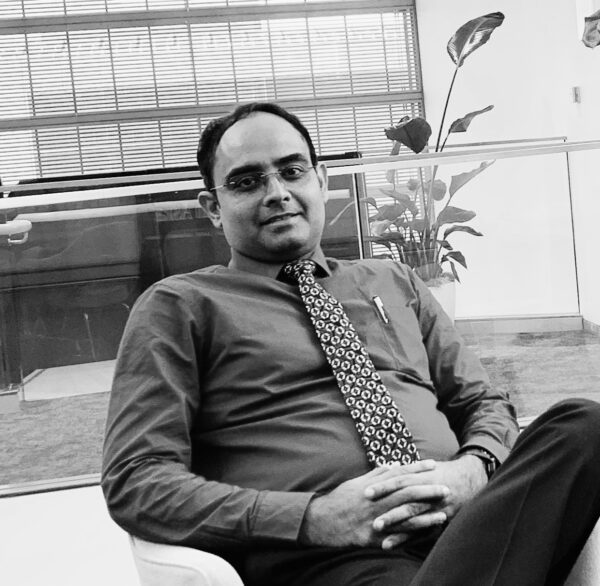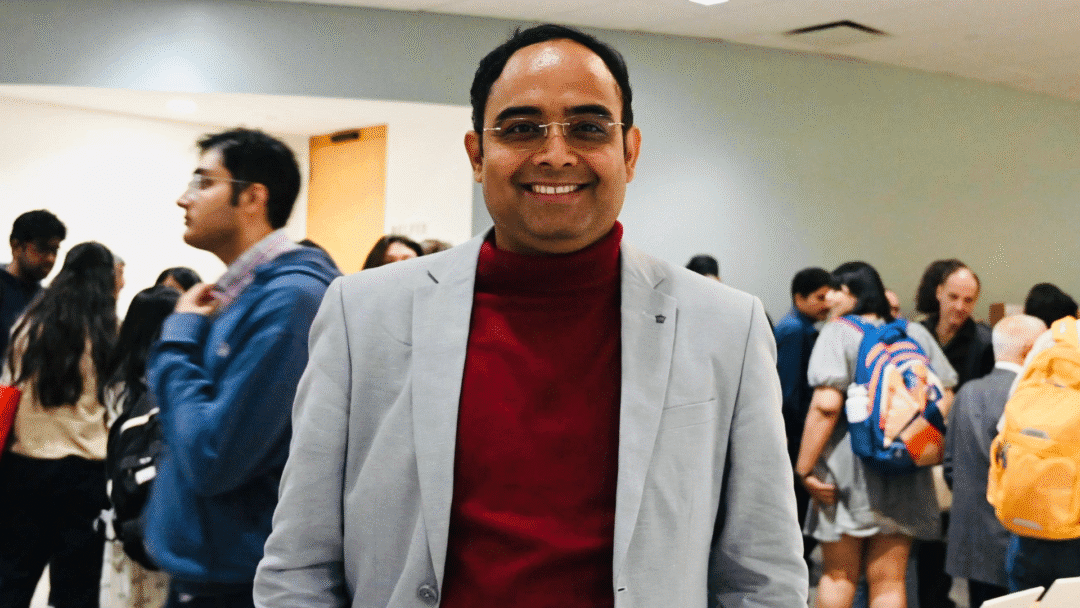Sachin Kumar, the Mittal Family Climate Fellow, studies Artificial Intelligence, particularly the intersection of AI technology and societal impact. His research focuses on leveraging AI/ML to solve urban and societal challenges, specifically urban governance, climate change and sustainability. Currently serving as an Assistant Professor at the Cluster Innovation Centre, University of Delhi, he is also the Executive Officer of the University of Delhi Foundation. We spoke with Dr. Kumar about his research and what he hopes from his Mittal Institute fellowship.

Dr. Sachin Kumar
Mittal Institute: Welcome to Harvard University, Sachin! Your research applies AI/ML to tackle challenges like climate change. How did you first become interested in this field?
Sachin Kumar: Thank you. Serving and working at Harvard University is an honor. My interest in applying AI/ML to address climate change and related challenges began at the intersection of two deeply personal and intellectual epiphanies. First, I have always been curious to use technology and knowledge to solve societal problems. Second, while working on doctoral research on building energy performance modelling, I saw how cities and urban spaces contribute a significant percentage of carbon emissions, and there is huge socio-economic potential in cleaning and making them smarter and sustainable. At the same time, greater exposure to AI introduced me to its vast potential—not just as a technological tool, but as an innovative approach for understanding complex socio-economic and environmental systems in their entirety. I realized that AI can be a game-changer for climate actions because climate change itself is a complex issue, with several interconnected variables, immense historical data, and the necessity for timely predictive, adaptive solutions to ensure proper assessment, monitoring and accountability of climate change efforts and their progress. That set me on the path to explore my research direction to use AI/ML at the intersection of technical and social interface to make our society sustainable for all stakeholders.
I transitioned to AI for social good, and more particularly, urban issues, climate actions, sustainability and resilience. What is most interesting to me is not just that AI is providing us with improved models and predictions, but we have the potential to apply AI to address emerging societal challenges. For me, it is a challenge of intellect and responsibility—because solving and addressing several dimensions of climate change is as much about innovation as it is responsibility.
What is most interesting to me is not just that AI is providing us with improved models and predictions, but we have the potential to apply AI to address emerging societal challenges.
Mittal Institute: “AI for Social Good” is central to your work. What project or result are you most proud of, and why?
Sachin Kumar: “AI for Social Good” is not just a phrase for me; it is the way I see that AI can help in solving societal problems at the local or global level. I structure my problem-solving approaches and research so that novel methods change outcomes for people and the community. The work I am most proud of gave me insights directly out of my doctoral work, where I worked on machine-learning models for modeling and prediction of building energy performance. That work combined domain knowledge in building physics with scalable ML techniques to produce models that are both accurate, efficient and interpretable — a combination that is crucial when you want stakeholders such as residents, building managers, city planners, or policy teams to act on algorithmic recommendations to make building’s energy efficient and sustainable, leading to the city’s sustainability.
Later on, I experimented and moved into a domain where we can use computational techniques and AI/ML for addressing heterogeneous societal problems. I worked on AI/ML methods and several diverse problems, such as analyzing digital/social media content in the context of election dynamics, developing models for fake news and misinformation propaganda, predicting public perception for election results, analyzing climate actions and their monitoring and AI governance, etc. I published my research work in reputed international journals and conferences. This gave me direction and substance that I should use AI/ML for addressing urban and social problems to make an impact in society. I love this domain as it is in sync with my aptitude to create knowledge and to develop solutions to take society to the next level, specifically addressing the problems faced by the global south and emerging economies. I always ask, ‘Am I solving a socially relevant problem? How will the outcome of the project/research work improve the lives of stakeholders? Will the model be accurately developed, deployed, and used?’ That led me to focus on AI tools/practices, and translating technical results into actionable insights and utilities for cities and communities, which is precisely what “AI for Social Good” requires.

Dr. Sachin Kumar
Mittal Institute: How do you see the role of AI evolving in the fight against climate change over the next decade?
Sachin Kumar: In my opinion, AI can immensely help in the present time to address climate change, but over the next decade, AI will become a central pillar in the fight against climate change, moving from research to real-world deployment across several dimensions needed to address climate change, such as assessment, monitoring, prediction, optimization, and accountability. AI systems will more aggressively integrate data from diverse sources such as satellites, IoT devices, and citizen sensors to create continuous, real-time monitoring of deforestation, emissions, air quality, and urban vulnerabilities at local, global and hyperlocal scales. Advances in predictive modeling will enable accurate forecasts of energy demand, extreme weather, and environmental risks, supporting scenario-based resources management, planning and better decision-making. AI will guide climate mitigation by optimizing building energy systems, renewable energy integration, transportation networks, and land use planning, ensuring efficient and adaptive solutions that reduce carbon footprints comprehensively. Technical success alone will not be enough, and it needs efforts at the individual level, community level and national and global levels. As AI starts to influence policies and investments, transparency, fairness, and accountability will be vital, requiring explainable models, ethical governance frameworks, and mechanisms to evaluate real impact in the climate domain. AI have also started being used for tracking climate finance, carbon credits, and sustainability reporting, reducing fraud and greenwashing.
Over the next decade, AI will become a central pillar in the fight against climate change, moving from research to real-world deployment across several dimensions needed to address climate change.
Mittal Institute: What are the most underexplored opportunities for AI to contribute to climate action?
Sachin Kumar: I think AI’s most underexplored climate action opportunities are scaling solutions in developing nations and emerging economies, supporting adaptation and resilience, improving environmental monitoring, democratizing policy tools, and powering nature-based interventions with advanced AI. In developing nations, AI can offer tailored tools for energy management and disaster prediction, but requires investment in digital infrastructure and local expertise to be effective. Adaptation-focused AI could revolutionize early warning systems, urban resilience, and local risk models, helping protect vulnerable communities. AI can improve power grid stability, help integrate renewable energy sources, and optimize transport and land use. Such advances could enable these regions to leapfrog traditional, polluting infrastructure and adopt cleaner alternatives more rapidly.
Additionally, AI-driven personalized tools that encourage behavioral changes in consumers or nudges toward sustainable product choices represent another underexplored frontier. When it comes to resilience and adaptation, AI can enhance early warning systems for climate disasters such as droughts and floods, support urban resilience planning, and improve sustainable land and water management. AI’s role in optimising waste management and recycling is also gaining attention, as it can help reduce methane emissions by enabling greater material recovery.
Further opportunities include using AI for environmental monitoring that addresses vulnerabilities in critical infrastructure and supports biodiversity conservation. Importantly, many developing countries face unique challenges such as gaps in digital infrastructure, data scarcity, and limited AI expertise. While AI applications in renewables and energy efficiency have received considerable focus, these broader areas, spanning innovation, behaviour change, adaptation, waste management, ecosystem conservation, and equity in technology access, remain relatively underexplored. Unlocking AI’s potential in these domains could drive deeper, more inclusive progress against climate change, especially in parts of the world that need it most.
Mittal Institute: Can you discuss the project you will be working on while a Mittal Family Climate Fellow?
Sachin Kumar: I will be working on a project that addresses the global challenge of climate change, particularly the urgent need for rigorous monitoring and independent evaluation of climate actions to achieve Sustainable Development Goals (SDGs). My research work will explore and intend to develop innovative AI methods to assess outcomes and progress of multidimensional climate actions of countries as independent stakeholders to ensure accountability, transparency, continuous monitoring, and ensure stakeholder’s claims align with actual climate outcomes, and if not, gaps are objectively quantified and visible. Research work will build new scientific approaches leading to novel AI models aiming to provide a more comprehensive picture of climate actions of governments/institutions and identify gaps in climate mitigation strategies using heterogeneous data like textual reports and structured or unstructured datasets available publicly. These AI models will simulate dynamic emission scenarios, monitor sustainability progress, and cross-check claims of stakeholders, specifically of countries.
Mittal Institute: What excites you most about your fellowship and Harvard University?
Sachin Kumar: What excites me the most at Harvard University is the unique opportunity to be part of global interdisciplinary research and intellectual space that bridge academic excellence and innovation with meaningful societal impact. I always dreamed of to become part of global intellectual space and contribute in terms of impactful research in AI/ML, intelligent information systems, urban computing, AI for social good, climate change and governance. I am thankful to Harvard University for giving me this opportunity to learn, grow and advance my research on AI and climate actions as a transformative tool to address real world challenges and make this world a better place.
What excites me the most at Harvard University is the unique opportunity to be part of global interdisciplinary research and intellectual space that bridge academic excellence and innovation with meaningful societal impact.
It provides a unique platform for me to articulate and join the world-class AI environment, to address the pressing regional and global challenges we face as a society, such as urban issues, climate change, and to develop solutions which are fair, inclusive and promote sustainable development. I particularly appreciate the Mittal Institute’s ambition to bring together scholars, policymakers, and practitioners from different disciplines. This resonates with my interdisciplinary approach that converges computer science and AI technology, with social impact, policy, and culture into shared societal outcomes. At Harvard, I get to engage with world-class faculty across disciplines, knowledge creators, social interventionists, change makers, and policy leaders to work together with intellectual rigour and openness that drive new ideas and breakthroughs.
I look forward to bringing my knowledge of AI/ML for Social Good to contribute to the Harvard ecosystem, which values academic inquiry and strives to translate research into scalable impact. What excites me the most is the Harvard ecosystem, which inspires me to think beyond disciplinary boundaries, co-create knowledge with global thought leaders through collaborations that strengthen my research work and academic excellence. It acts as a launching pad for innovation, global conversations, and action—and I can not wait to learn and engage on this incredible adventure.
☆ The views represented herein are those of the interview subjects and do not necessarily reflect the views of the Mittal Institute, its staff, or its steering committee.
